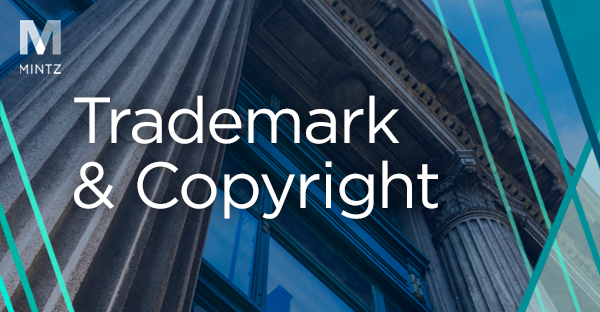
Intellectual Property
Viewpoints
Filter by:
PTAB’s Precedential Opinion Panel Rejects Review of Decision Denying Institution Due to Proximity of District Court Trial, and Remands Back to Panel for Supplemental Briefing
April 14, 2020 | Blog | By Daniel Weinger
The Precedential Opinion Panel (“POP”) of the U.S. Patent Trial and Appeal Board (“Board”) recently rejected a rehearing request from a petitioner where institution was denied because of the likelihood that a district court trial would occur prior to a final written decision.
Read more
PTAB Must Give Parties Notice of Unpatentability Theories when Considering Motions to Amend
April 14, 2020 | Blog | By Daniel Weinger
On Thursday, the Federal Circuit ruled that the Patent Trial and Appeal Board (“PTAB”) must give the parties proper notice if considering a sua sponte theory of unpatentability in relation to a motion to amend.
Read more
Celgene v. Sun Pharma Global: Satisfying Subject Matter Jurisdiction Under § 271(e)(2)
April 13, 2020 | Blog | By Adam Samansky, Peter Cuomo, Joe Rutkowski
On April 6, 2020, the U.S. District Court for the District of New Jersey, in Celgene Corp. v. Sun Pharma Global FZE, No. 19-cv-10099, denied Sun’s motion to dismiss Celgene’s claims that Sun’s generic Revlimid® (lenalidomide) Abbreviated New Drug Application (ANDA) product infringes three patents not listed in the Orange Book for Revlimid® and for which Sun did not make any Paragraph IV certifications.
Read more
Considering a Purchase, Sale, or Financing? Make Sure Your Trademark Due Diligence is Thorough
April 9, 2020 | Blog | By Susan Neuberger Weller
Trademark due diligence is the process of analyzing information concerning a company's trademark portfolio and assessing the risks, exposures, and benefits associated with a proposed transaction. In an acquisition, both the buyer and the seller need to ensure that they each are fully informed as to the status of the trademarks at issue.
Read more
How to Maintain Your Trademark Rights When Your Business is Closed
April 8, 2020 | Blog | By Susan Neuberger Weller
Trademark rights in the US are based on use of a mark not on registration. Failure to use your mark on a product or to offer a service to the public can result in an abandonment of your trademark rights and an inability to maintain an existing registration.
Read more
Adding Initials to a Surname Does Not Necessarily Create a Protected Trademark
March 26, 2020 | Blog | By Susan Neuberger Weller
In a recent precedential decision, the TTAB held that the addition of one initial —or possibly even more than one initial—in front of a surname does not necessarily create the impression of a personal name. Rather, the Board held that a surname plus one or more initials may remain “primarily a surname” and, as such, cannot be registered on the Principal Register without proof of acquired distinctiveness.
Read more
YouTube Enables Ads on Coronavirus Content; Brands Should Evaluate Strategies to Mitigate Inadvertent Backlash
March 26, 2020 | Blog | By Karen K. Won
Adding another layer of complexity to sensitively marketing in the COVID-19 environment, YouTube announced on March 11 that it will permit certain creators to monetize (i.e., enable ads on) content relating to coronavirus. Companies and brands should review their approach in this pandemic, including refining YouTube content exclusion parameters and policing their ad environments, if they do not wish to risk association with potentially undesirable videos.
Read more
The PTAB Designates Three Decisions Related to Discretion to Institute as Precedential or Informative
March 26, 2020 | Blog | By Daniel Weinger
On Tuesday, March 24, 2020, the Patent Trial and Appeal Board (“PTAB”) designated two inter partes review (“IPR”) decisions as precedential and one as informative. These decisions concern PTAB’s discretion to deny institution of an IPR under 35 U.S.C. § 325(d) and 314(a).
Read more
2nd Circuit Affirms 5Pointz Whitewashing Violated Visual Artists Rights Act
March 25, 2020 | Blog | By Susan Neuberger Weller
The Second Circuit recently affirmed that a developer’s whitewashing of street art painted at the “5Pointz” warehouse complex in Long Island City was a violation of the Visual Artists Rights Act (“VARA,” codified at 17 U.S.C. § 106A).
Read more
Federal Circuit Denies En Banc Rehearing of Panel Decision in Arthrex, Which Held PTAB Appointments Were Unconstitutional
March 25, 2020 | Blog | By Daniel Weinger, Michael Newman, Matthew Galica
This week the en banc Federal Circuit declined to revisit a panel ruling that found the appointment of Administrative Patent Judges (“APJs”) of the Patent Trial and Appeal Board (“PTAB”) violates the Appointments Clause of the Constitution. This decision is notable for at least two reasons. First, it declined to review or disturb the panel’s conclusion and its remedy—vacatur and remand of PTAB decisions made by unconstitutionally appointed APJs. Second, four of the Federal Circuit judges dissented, disagreeing with the panel’s finding and saying that its corresponding remedy improperly rewrites the statute contrary to Congressional intent.
Read more
Federal Judge Confirms that Federal Trade Secret Statute Applies to Misappropriation that Occurs Overseas
March 11, 2020 | Blog | By Michael Renaud, Nicholas Armington
Earlier this month, a Northern District of Illinois jury returned a verdict in favor of Motorola for over $700 million after a trial in which Motorola alleged that Hytera hired three engineers away from Motorola’s Malaysian office, and that those engineers stole and brought with them thousands of Motorola’s trade secret technical documents that Hytera used to develop a state-of-the-art digital radio that was functionally indistinguishable from Motorola’s.
Read more
The Masters’ Green Jacket is Now a Registered Trademark
March 10, 2020 | Blog | By Susan Neuberger Weller
Since 1949, a green jacket has been awarded to the winner of the Masters Tournament, one of golf’s four major championships.
Read more
Samsung v. Prisua Engineering Corp.: Indefiniteness Rulings Off-Limits for the Patent Trial and Appeal Board
March 5, 2020 | Blog | By Michael Newman, Kevin Amendt
The Court of Appeals for the Federal Circuit ruled in February that the Patent Trial and Appeal Board (PTAB) cannot cancel claims for indefiniteness in an inter partes review (IPR) proceeding. The case is Samsung Electronics America, Inc., v. Prisua Engineering Corp., case number 19-1169, in the U.S. Court of Appeals for the Federal Circuit.
Read more
Too little, too late: Federal Circuit holds that cessation of sales does not alleviate patentee’s affirmative duty to mark
February 26, 2020 | Blog | By Daniel Weinger
In a February 19, 2020 decision the Federal Circuit held that a patentee does not escape 35 U.S.C. § 287’s marking requirement merely by ceasing sales of the practicing product. Instead, the Federal Circuit held that once a patentee (or its licensees) sell articles that practice the patent, the obligation to mark in order to obtain pre-suit damages continues regardless of whether sales of the product in question cease.
Read more
Infringement Contentions: Fair Notice?
February 18, 2020 | Blog | By Michael Renaud, Adam Rizk, Catherine Xu
Some respondents at the ITC have taken advantage of using infringement contentions as a procedural tool to deny patent owners from getting their day in court. In some investigations, respondents have gone so far as to delay their own production of discovery until after the infringement contention deadline, then claim lack of fair notice when the patent owner uses the late discovery in its expert report.
Read more
Patenting Considerations for Artificial Intelligence in Biotech and Synthetic Biology – Part 2: Key Issues in Patent Subject Matter Eligibility
January 30, 2020 | Blog | By Terri Shieh-Newton, Marguerite McConihe
In our first blog in this multi-part series, we explored key considerations for protecting artificial intelligence (“AI”) inventions in biotech and synthetic biology. In this part 2 of the series, we will examine some key considerations and hurdles in patenting machine learning-based biotech or synthetic biology inventions.
Read more
An Informative PTAB Decision on Patent Eligibility under 35 U.S.C. § 101
January 30, 2020 | Blog | By Christina Sperry
The U.S. Patent Trial and Appeal Board (“PTAB”) recently designated its decision in Ex Parte HANNUN (Appeal 2018-003323) (“HANNUN”) as being informative regarding the application of the latest 2019 revised guidance on patent-eligible subject matter.
Read more
Update on Federal Register Notice on Artificial Intelligence (AI) Patent Issues
January 21, 2020 | Blog | By Michael Renaud, Marc Morley
As noted in our previous post, the U.S. Patent and Trademark Office (USPTO) published a request for comments for a list of questions regarding Artificial Intelligence (AI) Patent Issues in the Federal Register on August 21, 2019. While the comment period has closed, a few developments regarding AI patent issues have occurred that are particularly relevant.
Read more
Congress Considers Creation of a “Copyright Claims Board” as an Alternative to Handle Small Copyright Claims
January 8, 2020 | Blog | By Susan Neuberger Weller, Lei Xu, PhD
On Tuesday, October 22, 2019, the US House of Representative approved, by 410-to-6, the Copyright Alternative in Small-Claims Enforcement (CASE) Act of 2019, introduced under H.R.2426 by Representative Hakeem Jeffries (D-NY). This bill aims to “establish an alternative dispute resolution program for copyright small claims,” and creates the Copyright Claims Board, a body within the U.S. Copyright Office, to decide copyright disputes.
Read more
Federal Circuit Awards Attorney Fees to the Defendant Following Dismissal of Lawsuit by Plaintiff
January 7, 2020 | Blog | By Ken Jenkins
The Federal Circuit affirmed a district court award of over $360,000 in costs and attorneys’ fees against a non-practicing entity, citing the need “to deter future abusive litigation.”
Read more
Explore Other Viewpoints:
- Antitrust
- Appellate
- Arbitration, Mediation & Alternate Dispute Resolution
- Artificial Intelligence
- Awards
- Bankruptcy & Restructuring
- California Land Use
- Class Action
- Complex Commercial Litigation
- Construction
- Consumer Product Safety
- Cross-Border Asset Recovery
- Debt Financing
- Direct Investing (M&A)
- Diversity
- EB-5 Financing
- Education & Nonprofits
- Employment
- Energy & Sustainability
- Environmental Enforcement Defense
- Environmental Law
- FDA Regulatory
- Federal Circuit Appeals
- Financial Institution Litigation
- Government Law
- Growth Equity
- Health Care
- Health Care Compliance, Fraud and Abuse, & Regulatory Counseling
- Health Care Enforcement & Investigations
- Health Care Transactions
- Health Information Privacy & Security
- IP Due Diligence
- IPRs & Other Post Grant Proceedings
- Immigration
- Insolvency & Creditor Rights Litigation
- Institutional Investor Class Action Recovery
- Insurance & Financial Services
- Insurance Consulting & Risk Management
- Insurance and Reinsurance Problem-Solving & Dispute Resolution
- Intellectual Property
- Investment Funds
- Israel
- Licensing & Technology Transactions
- Life Sciences
- Litigation & Investigations
- M&A Litigation
- ML Strategies
- Medicare, Medicaid and Commercial Coverage & Reimbursement
- Mergers & Acquisitions
- Patent Litigation
- Patent Prosecution & Strategic Counseling
- Pharmacy Benefits and PBM Contracting
- Portfolio Companies
- Privacy & Cybersecurity
- Private Client
- Private Equity
- Pro Bono
- Products Liability & Complex Tort
- Projects & Infrastructure
- Public Finance
- Real Estate Litigation
- Real Estate Transactions
- Real Estate, Construction & Infrastructure
- Retail & Consumer Products
- Securities & Capital Markets
- Securities Litigation
- Special Purpose Acquisition Company (SPACs)
- Sports & Entertainment
- Strategic IP Monetization & Licensing
- Tax
- Technology
- Technology, Communications & Media
- Technology, Communications & Media Litigation
- Trade Secrets
- Trademark & Copyright
- Trademark Litigation
- Value-Based Care
- Venture Capital & Emerging Companies
- White Collar Defense & Government Investigations
- Women's Health and Technology







